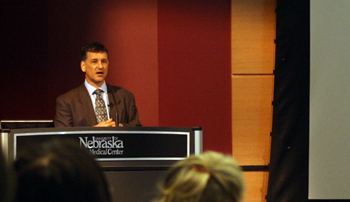The next time you can’t get Journey’s “Don’t Stop Believing” out of your head, don’t be too hard on yourself. It’s likely part of our evolution.
 |
Daniel Levitin, Ph.D., speaks at UNMC on Wednesday. The cognitive neuroscientist discussed the way music affects the brain. (Nainsi Houston, Ph.D., Kaneko-UNO Library) |
The cognitive neuroscientist who helped musicians such as Santana, the Grateful Dead and Chris Isaak make records, showed how music stimulates the same area of the brain affected by sex, drugs and chocolate. He also discussed the thought that some are genetically predisposed to play music (an assertation that is hard to quantify, Dr. Levitin said).
|
Below are paraphrased versions of some of Dr. Levitin’s responses during a Q&A session where he hit on several issues including evolution’s possible role in those catchy songs, or “ear bugs.”
On why certain songs seem to stick in our heads
This phenomenon may be an evolutionary trait as humans have long known that song is a powerful tool to pass along information. Long before written word was developed, humans would create songs to transmit vital information such as how to avoid illness. Even today, most children learn the alphabet through song. Composers who create catchy songs have been successful because they made music that our brains find irresistible.
|
It does seem there is a sensitive period for learning music. Most great musicians were exposed to and taught music early on. That’s not to say it’s impossible for someone to learn music as they age.
On whether playing classical music to a young child can make the child smarter
It probably won’t make them any smarter, but it may very well make them like classical music.
Interesting story. Right now a song that I recently downloaded has been staying in my head. It is called Bleeding Love by Leona Lewis. I downloaded it about two weeks ago and the lyrics are still in my head.
Lady Gaga "Telephone". And I'm one of the few people who isn't even a fan. Maybe Dr. Levitin has cracked the code of her success!
Thanks a lot, Chuck, that song is indeed stuck in my head, now. Until the next tune comes along. I am plagued with head music 24 hours a day, usually the last thing I hear, including commercials and ringtones. My co-workers have to remind me to stop whistling, humming, or singing, and I even wake up in the middle of the night with songs blaring like a radio in my brain. I heard a story on NPR last year about people who have "auditory musical hallucinations," mostly musicians, and I seem to fall into that category. I wish I had made it to the seminar!
I'm kinda busy, kinda busy … touche Laura Shafer!
It's no so much Journey stuck in my head, it's any Whitney Houston song!!! 🙂